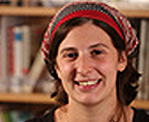Lea Taragin-Zeller

Lea Taragin-Zeller is a doctoral student at the Department of Sociology and Anthropology at the Hebrew University of Jerusalem. Her areas of research are: Sociology and Anthropology of Religion, Haredi society in Israel, gender, family and fertility.
She holds a BA in Sociology and Anthropology combined with a General BA in Liberal Arts, focused in: Jewish Philosophy and Jewish and Comparative Folklore. Lea continued her studies in the department of Sociology and Anthropology at the Hebrew University where she completed an MA while writing her thesis about Modesty among Orthodox Female Teenagers in Israel. During these years, she served as a research and teaching assistant in various courses in the department, has published articles and has received several scholarships and awards. In addition, Lea teaches and lectures on Judaism, feminism, culture and religion in various settings, including: Midreshet Ein Hanatziv and Mechinat Ha’emek.
Lea is currently writing a Phd dissertation about the Contemporary Family Planning Discourse among Ultra-Orthodox and Orthodox Jews in Israel.![]() Israel is an exceptional case-study in which Israeli-Zionist pro-natalism ideologies are intertwined with a Jewish tradition which posits fertility as a religious ideal, a link that is mirrored in government and medical policy as well as through the religious authorities discourse. Hence, Orthodox couples with fertility difficulties struggle within a unique setting wherein both the religious and cultural discourses apply significant pressure regarding issues of fertility. Part of her research project focuses on couples who visit sacred places as part of their struggle to achieve the accepted fertility standards. She examines the different reasons, experiences and stories of couples (especially women) who visit religious sites, especially those that are known to heal fertility difficulties. She is especially interested in the role these pilgrimages have in the couple’s narratives about fertility, faith and religion.
Israel is an exceptional case-study in which Israeli-Zionist pro-natalism ideologies are intertwined with a Jewish tradition which posits fertility as a religious ideal, a link that is mirrored in government and medical policy as well as through the religious authorities discourse. Hence, Orthodox couples with fertility difficulties struggle within a unique setting wherein both the religious and cultural discourses apply significant pressure regarding issues of fertility. Part of her research project focuses on couples who visit sacred places as part of their struggle to achieve the accepted fertility standards. She examines the different reasons, experiences and stories of couples (especially women) who visit religious sites, especially those that are known to heal fertility difficulties. She is especially interested in the role these pilgrimages have in the couple’s narratives about fertility, faith and religion.